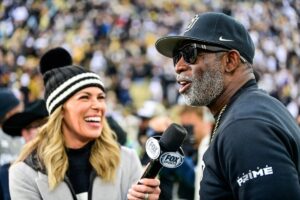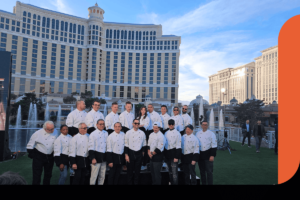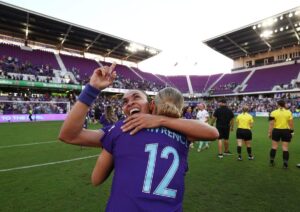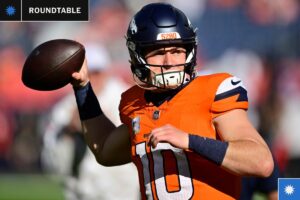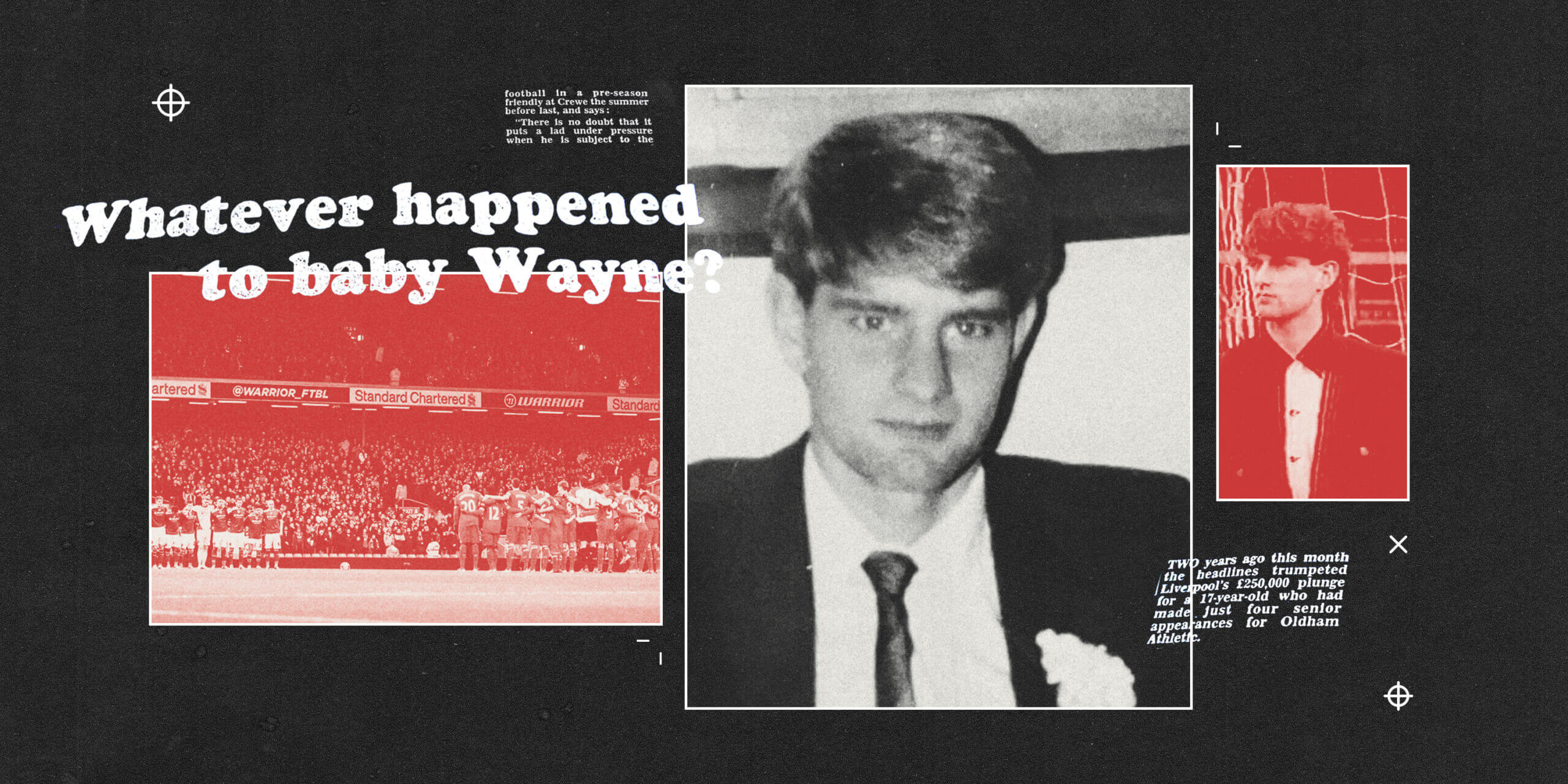
The scrapbook is meticulously preserved, a series of newspaper clippings saved and collated by a proud father.
It charts almost every step on Wayne Harrison’s journey towards the big time, from first kicking a ball for Woodsmoor Colts and goalscoring exploits for Stockport Boys and Greater Manchester Boys, to making his professional debut for Oldham Athletic at 16 and then becoming the most expensive teenager in football history when he joined Liverpool in a £250,000 deal shortly after turning 17.
At her home in Stockport, his sister Adele chuckles at some of the descriptions: “teenage wonder”, “soccer saviour”, “wonder waif”. She could never get her head around the idea that her younger brother was a football prodigy.
To his family, he was always just “Our Wayne”. “A proper mummy’s boy,” Adele says. “He never left his mum’s side except to go to school and play football.”
As we leaf through the scrapbook, the tone of the headlines changes: from “Whizz Kid Wayne” to “forgotten starlet” and “invisible man”, a player bedevilled by injuries, lost in the system at Liverpool, unable to break into their all-conquering team of the 1980s. Two separate headlines from that time ask, “Whatever happened to Baby Wayne?”, riffing on the title of a 1962 film starring Bette Davis and Joan Crawford.
What happened to Harrison was a tragedy — a career curtailed by injury, forcing him to retire at the age of 23, and then, ultimately, a life cut short.

Injuries didn’t just wreck Harrison’s career; they damaged his life.
After more than 20 operations on his knee, he ended up unable to work, living on disability benefits, his dreams shattered, a glorious future far behind him — “heartbroken”, Adele says — before he died of pancreatic cancer on Christmas Day 2013.
News of Harrison’s death, at the age of 46, sent a brief tremor through English football.
Tributes poured in for a player whose rare talent was matched only by his capacity for misfortune. An FA Cup tie between Liverpool and Oldham fell poignantly just over a week later, allowing both sets of fans and players to commemorate Harrison with a minute’s applause at Anfield. But then the ovation faded away and football forgot him for a second time.
Ten years on, this feels like an opportune moment to remember Harrison and to tell his story in depth. Not just the dramatic rise, the record-breaking transfer, the injuries and the struggle to live up to expectations, but the growing pains of an ordinary boy who longed for the normal life his extraordinary talent had taken him away from — and who then, plunged back into normal life, his dreams shattered, was left lamenting the career he could have had.
He was barely out of school.
Harrison was a few weeks short of his 17th birthday when he made his Football League debut in October 1984, becoming the youngest first-team player in Oldham’s history. His strike partner Micky Quinn, who went on to play for Coventry City in the Premier League, recalls, “Wayne looked like a gust of wind could knock him over. But he was razor-sharp.”
Harrison scored on his second league appearance, against Huddersfield Town on Boxing Day, and then in an FA Cup tie against Brentford soon after. Scouts flocked to Boundary Park to watch him, but Liverpool had been on the case since he scored twice against them as Oldham pulled off a shock in an FA Youth Cup tie at Anfield just before Christmas.
“Wayne was outstanding that night,” says Oldham’s former youth-team coach Billy Urmson. “We beat Liverpool 4-3 and he murdered them. Liverpool had a well-known youth scout called Tom Saunders and when we came off the pitch and went into the boot room, Tom wanted to know everything about Wayne.”
Saunders took a trip to Oldham to watch Harrison again at the next opportunity. This time he had Ron Atkinson, Manchester United’s manager at the time, for company. Both were convinced the kid was worth a punt — particularly if there was a danger he would join their fiercest rivals. Atkinson made a £25,000 offer there and then. Oldham turned it down. He raised the offer to £40,000. Again, Oldham said no. Atkinson took counterpart Joe Royle out for a meal in the hope of twisting his arm.
“And then while we were at dinner,” Atkinson says, “Liverpool’s chairman, Sir John Smith, rang the chairman at Oldham, Ian Stott, and Ian told him it was £250,000 for Wayne and that I was out for dinner with Joe Royle at that moment so he would have to be quick. John Smith sanctioned the deal, and that’s how it was done. I always remind Joe I got him an extra £200,000 for Wayne — and I still picked up the bill for our meal!”
Harrison’s subsequent struggles led some, including Liverpool’s former captain Phil Neal, to speculate that the Merseyside club might have been the victim of a “sting” between United and Oldham.
Royle and Atkinson say there was nothing of the sort. Atkinson was very keen on Harrison but, under pressure to deliver United’s first league title since 1967, he couldn’t afford to spend heavily on such a long-term prospect. Liverpool, with the previous season’s League trophy and European Cup in the trophy cabinet and money in the bank, could afford a longer-term investment, particularly if the outlay helped them avoid a tax bill at the end of the financial year.
While the size of the fee surprised Royle, he felt Liverpool were getting a special player.
“He was lightning,” the former Oldham and later Everton manager says of Harrison. “He was very similar to Michael Owen. He always wanted to run in behind the defence and his finishing was exceptional. I thought he had a great chance of reaching the very top.
“Wayne was the real thing. He really was.”

Harrison with Liverpool manager Joe Fagan after his move to Anfield (ITN)
Amid considerable fanfare, Harrison signed on the dotted line at Liverpool, whose manager Joe Fagan said he was the type of “special player” you hear about “perhaps once in 20 years”. Alongside Fagan, decked out in Liverpool hat and scarf, Harrison smiled awkwardly, looking like someone who can’t quite believe what is happening to them.
The plan was to return to Oldham on loan for three months, keep playing first-team football, before moving to Liverpool permanently. “But we cut it short,” Royle says. “The kid’s head, naturally, had been turned. He wanted to be at Liverpool and to get on with his career there.”
Did he, though? Did Harrison really want to play for Liverpool?
His sister Adele thinks not. Long-term, yes, but not with his career still in its infancy.
“He supported them and his bedroom was all decorated in Liverpool stuff, but I don’t think he wanted to go there when he did,” she says. “I don’t think he was ready for it. He just wanted to come home every day. He was a home bird, really. That was our Wayne.”
This isn’t just the perspective of a big sister with no interest in football. Harrison said it explicitly in interviews at the time (“I never wanted to leave”) but Oldham’s financial situation had left him with little choice. He also told Royle he didn’t “really fancy spending three years in Liverpool’s reserves”.
That turned out to be an underestimation. By the end of his first full season at Liverpool, almost 18 months on from his big-money transfer, Harrison’s only taste of first-team football had come in a pre-season friendly at Crewe Alexandra. It was proving hard enough to establish himself in Liverpool’s reserves.
On the face of it, that seemed entirely normal. For one thing, he was still only 18. For another, this was simply what Liverpool did in the 1980s. Ronnie Whelan, Ian Rush, Steve Nicol and Jim Beglin had all joined as teenagers and spent at least 12 months in the reserves, learning the fabled Liverpool Way, before starting to feature regularly in the first team.
But Phil Thompson, who took over as reserve-team coach in 1986, had a few concerns. He clashed with Harrison, unable to get through to a player who drifted through training sessions.
“For a couple of years, he stagnated,” Thompson, a former Liverpool captain and assistant manager, says. “He wasn’t cutting the mustard as we’d hoped. We tried everything — arm around the shoulder, the odd rollicking, all sorts, trying to do the best for him — and nothing worked.”
Then there was a withering assessment from Neal in his autobiography, Life At The Kop.
The former captain had overlapped with Harrison for less than a year, having left for Bolton Wanderers in December 1985, but he was scathing of the youngster. “At Boundary Park he used to go to work on the bus, whereas now he drives a big BMW, but that’s about the only thing that has changed,” Neal wrote. “To me, Wayne looks like a bewildered youngster who has been taken away from his friends and cannot for the life of him work out why.”
Those comments came in the wider context of an attack on Liverpool chairman Smith, whom Neal never forgave for appointing Kenny Dalglish ahead of him as player-manager in the summer of 1985. But he was right that Harrison felt bewildered and lost.
“He found it difficult to settle,” Thompson says. “I think some of the younger lads, seeing he had come in on a lot of money, thought it was arrogance at first. I don’t think it was, but he came in, trained and went back to Stockport and never mixed with the other lads. Living in Stockport (a southern Manchester suburb an hour’s drive from Liverpool) sort of alienated him.”
It also made him a target when he was back home. “He still wanted to be part of the crowd around here,” Adele says. “He was still the same person, but for some other people jealousy kicked in. He got a smart car and then he went to the local club and his tyres got slashed. A couple of lads nicked his car and put it around a lamppost. He went to one of the pubs — not a very nice place — and had his face smashed in.
“But he didn’t want to move away from home. I think if he had done, it could have been a completely different life.”

Adele and her brother, Wayne (The Harrison family)
In December 1987, almost three years after his arrival at Anfield, Harrison expressed his disillusionment in a brutally frank interview with Shoot!, a UK football magazine.
“I’m going nowhere here,” Harrison said. “I haven’t really had much of a look-in and I can’t see the situation changing. Sometimes it’s as though nobody notices I’m here. I knew I would be stuck in the reserves for a while, but I’m not sure how much longer I can put up with it.”
And then there were the injuries: groin, pelvis, knee, a hernia and his shoulder. “Every injury imaginable,” says former Liverpool midfielder Mike Marsh, who played alongside him in the reserves. “Setback after setback.”
The most traumatic incident came on a pre-season trip to the holiday county of Cornwall in the far south west of England, when post-match drinks at the hotel led to high spirits, horseplay and near-disaster.
“I got a knock on my door and the person said, ‘Phil, you need to come downstairs. There’s been a bad accident’,” Thompson says. “I went down and it was like a scene from a horror movie. There was blood all over the walls and they were working on Wayne’s arm. I was just thinking, ‘What the bloody hell has gone on?’.”
There was no time to get answers. Harrison was rapidly losing blood and needed to get to a hospital. And in what seemed typical of his luck, this coincided with an ambulance workers’ strike in the UK over pay conditions, which meant the backup system, medics from the British army, had to be summoned to rush him to hospital for an emergency blood transfusion.
Testimonies differ over the incident. Marsh says it was “just a glass door” and that it was high spirits rather than anything too serious. Harrison said in one of his post-football interviews he had been “larking about, got into a scuffle and fell through a greenhouse and slashed my arms badly.”
Whatever the truth of the matter, Harrison was lucky the consequences were not worse than a 10-inch gash and a severed artery.
“But it just felt as if bad luck followed Wayne around,” Thompson said. “At times, you felt things just conspired against him.”
A loan move to Crewe, then as now in the fourth division of English football, was designed to build up his fitness and confidence. “But I remember being disappointed in him,” Crewe’s then goalkeeper Dean Greygoose says. “He showed glimpses of his talent in training, but it was a different Wayne in matches. He never really showed it enough.”
An interview with UK newspaper The Times laid bare the depth of Harrison’s torment.
“Oldham was a friendly, small club. Liverpool is a big, busy club,” he said, explaining that he “couldn’t cope” when he first arrived. “There was no one for me to talk to. Liverpool just let you get on with it. They think it’s character-forming.”
It was another remarkably candid article, particularly because it asked serious questions about the mythologised “Liverpool way”.
“People say I’m lucky,” Harrison also said. “Just because I’ve got a few bob (made some money) and I’m with Liverpool doesn’t mean I’m lucky. I’ve been very depressed. I would sooner be playing than sitting at home.
“I would love — really love — to go back to Oldham. And I would never go back to visit Liverpool again.”
Gradually, things improved. He started to bond with his team-mates. He still lived in Stockport but began to socialise with Nick Tanner, Charlie Boyd, Marsh and others.
Tanner, who arrived from Bristol Rovers in 1988, describes Harrison as “a big practical joker, the life and soul of the party. And he was always getting in trouble. If anything was going on, Thommo (Thompson) would be like, ‘What’s Wayne doing now?’.”
Marsh has similar recollections. “He was a brilliant lad, a proper funny lad,” Marsh says. “He had a great sense of humour, a bit offbeat. When I say ‘offbeat’, I mean he would push it as far as he could to try to have a laugh. He wasn’t a goody-two-shoes, by any means. He would do anything for a laugh.”
Laughing and cringing, Tanner recounts a story from another pre-season trip to Cornwall when a group of the players went sea fishing, taking beers and Cornish pasties on board with them. They were out at sea when Harrison dived off the boat, swam underneath and out the other side with his team-mates, who were in on the joke, started shrieking, feigning distress, shouting “Man overboard!” and telling the vessel’s poor skipper to call the coastguard.
Harrison swam all the way back to shore — and got out of the water to be confronted with a furious Thompson.
It was touch and go whether Liverpool would extend Harrison’s contract beyond the summer of 1989 or simply let him go quietly to allow him to start his career afresh elsewhere. He ended up staying on the mutual understanding that the 1989-90 season would be make or break.
Ultimately, it was both.
“Gradually, things started to turn for Wayne and, my goodness, that season everything clicked for him,” Thompson says. “You could see the change in his whole demeanour. All of a sudden we were all thinking, ‘Now we have a player on our hands’. It was literally wow-factor.
“I remember Wayne saying to me he felt he could score whenever he was on the pitch. His form was amazing. You could tell the weight had been lifted off his shoulders.”

A still from a rare recording of Harrison, once the most expensive teenager ever, playing the game (ITN)
He scored 17 goals that season as Liverpool reserves won their league title.
“He was doing everything right to get into the first team,” Tanner says. “But a) he had Rushy (Ian Rush) and Peter Beardsley in front of him, b) Liverpool were winning everything, c) there were only two subs (per team per game) in those days and d) clubs would go full-strength in the cup games too.
“A young player in that situation at Liverpool these days would be on the bench for the first team every week, they’d play in the cup matches and they’d probably have a championship winner’s medal. In those days it was so hard to break through.”
But Harrison was on the right track at last… until the final moments of the last reserve game of the season, against Bradford City at Anfield, when he chased a ball into the penalty area and ended up in a heap under the opposition goalkeeper.
“I can picture it,” Thompson says. “Final minutes of the game, Anfield Road end, near the byline, the goalkeeper going up and falling awkwardly on Wayne’s leg. He was in agony.”
In interviews later, Harrison described feeling “physically sick”, saying his knee felt “wobbly from the inside”. He was taken to hospital and missed the reserves’ trophy presentation and photographs on the pitch, though Marsh is fairly certain Harrison joined his team-mates in the pub later to celebrate.
“None of us realised how serious it was,” Marsh says. “It was probably the next day when we heard he might have done his cruciate ligament.
“Especially in those days, when someone did their cruciate, you really feared for them. And we really feared for Wayne.”
Adele was too bound up in family life to take much notice of her brother’s football career. But she vividly recalls the 12 months that followed: a grim routine of hospital visits, scans, operations, consultations and increasingly bleak bulletins.
It was Graeme Souness, having succeeded Dalglish as manager in April 1991, who told Harrison the doctors had concluded that this was a losing battle — if he carried on playing, he risked ending up crippled. He later described the news as “soul-destroying”, saying that he “got in the car and just drove around for four hours”, not knowing what to do.
“You never think it’s going to happen to you,” Harrison told Shoot! in another article a few months later. “I left school at 16 without any qualifications. Football was all I was ever interested in. Football was my life. Now it’s all over and I’ve got to start thinking about another career. That’s the real problem.”
That was a different era. Even the best-paid players of Harrison’s generation did not make enough from the game to set them up for life. Former team-mates at Liverpool suggest his wages are unlikely to have gone much beyond £300 a week — £15,600 a year (just under $20,000 at the current exchange rate). He retired without ever making the first team, so the hoped-for appearances and win bonuses never materialised. And now, at age 23, his professional football career was over.
Harrison received an insurance payout and a pension from the Professional Footballers’ Association (PFA), the players’ trade union in England. But Tanner, who also had to retire from the game early due to injury, says the sums were “pretty miserly” in the context of the wages Harrison might otherwise have had as a young player in the early 1990s with English football heading towards the Premier League era.
Mick McGuire, a former Oldham team-mate who went on to work for the PFA, doesn’t dispute that. “It (the money he’s have received) was bugger-all, really,” he says.
Liverpool and Oldham agreed to play a testimonial match at Boundary Park in April 1992, with all proceeds going to Harrison. The attendance was reported at 4,400, earning him around £15,000 — a welcome windfall, but far from enough to secure his future.
The initial plan was for Harrison to play in that game — if only just a few minutes for ceremonial purposes. But even that proved beyond him.
There is a clip on YouTube from national broadcaster ITV’s News At Ten programme that evening, showing Harrison limping slightly, hand in his trouser pocket, as he leads the teams out. He is smiling, waving to the crowd, but then looks awkward as he stands to a side to make way for the players — “a final farewell,” says the ITV reporter, “to a game he was once set to dominate.”
In that latter Shoot! interview, Harrison spoke about his need to go to college and “learn another trade”.
“I’ve thought about training to become a physio,” he said. “But that could take years. I’ve got a mortgage to pay.”
Liverpool got in touch, offering financial support, at which point he could have asked them to help subsidise a physiotherapy course, but he still felt it would mean going too long without earning. Instead, he asked if they might help him train as a HGV (heavy goods vehicle) driver, so he could get a job as a drayman, delivering barrels of beer to pubs for Robinson’s, the local brewery.
“He enjoyed the work, driving around everywhere, taking the beer to the pubs, meeting people,” Adele says. “He knew a lot of the lads there and they would all have a laugh. But he always liked working. He worked at a shoe store in the market when he was 13. He bought his first house when he was 19. He was always a grafter and always savvy with his money.”
There were times when Harrison defied medical advice to play football again, making an unlikely comeback for Offerton Green in the Stockport District Sunday League — about as far from the glamour of Anfield as you could imagine.
Local legend has it that, even with his chronic knee problems, he still gave opponents the runaround and scored goals from the halfway line.

Harrison reflects on his career in Shoot! magazine
But it was no good. Sometimes it would leave him in agony for days afterwards, sometimes for weeks. In the end, he had to stop.
Harrison was briefly thrust back into the spotlight in 2002, when Wayne Rooney made his spectacular breakthrough at Everton.
Here was another teenager called Wayne turning heads and being talked about as English football’s next big thing — and there was the cautionary tale of a guy named Wayne who, as an interview with The Times put it, had left “football’s fickle theatre” and become a forgotten man, delivering barrels of beer to a pub “on a cold, drizzly street in Stockport”.
There was a clever reference to his “bitter cargo” but that did not extend to a chip on his shoulder. There was a cheery air of acceptance to that interview.
“Nobody recognises me these days, but I’m not bitter,” he told the newspaper. “But you do think about it all sometimes. Steve McManaman was my friend and look at him — he plays for Real Madrid. But I’ve been at the brewery now for five years and I love it.”
There were times when Adele wondered whether her brother might have been happier away from football: back among his friends in Stockport — not that he had ever really left them behind — and as one of the lads again, rather than someone whose status brought unwanted attention from outsiders.
The quiet “mummy’s boy” had become far more outgoing in adulthood. “He was the life and soul of the party,” she says. “If we went on a night out, everyone would be back to Wayne’s afterwards. He was so funny, always cracking one-liners and using cheesy chat-up lines,” she says. “And oh, the women…”
He seemed happy. Marsh says similar of their occasional meet-ups in later years. “It was just two footballers talking about old times, reminiscing,” he says. “It wasn’t, ‘Show me your scars’. I’m sure he had his moments at home where it was tough for him, but Wayne was always one to keep his spirits up. If he had other things going on, I wasn’t aware of them.”

Wayne Harrison (The Harrison family)
Few people were. But over time, the mask started to slip.
“Sometimes when it was just the two of us chatting, late at night, he would admit to me he was absolutely gutted,” Adele says. “I don’t know whether all the limelight at a young age affected him — I think it did — but then when he didn’t have it, he was heartbroken. It was his whole life, football. It took a grip of him, not being able to play football.”
He had become a father to a daughter, Faith, but he and her mother split up and they moved away. “He hardly saw Faith after that,” Adele says. “That broke his heart too, because he worshipped her.”
Then there was the physical pain in his knee. Moving on is hard enough for any athlete whose dreams have been thwarted by injury. When the pain it leaves you with is almost unbearable, a constant reminder of those shattered dreams and the price you paid for them, it must be harder still.
“He had 20-something operations on his knee, but it was a mess,” Adele says. “It got to the point where he couldn’t drive, so he could no longer do that job (as a drayman). He could hardly walk at times. His hand was a mess, because of an accident. He couldn’t work anymore and really started to struggle. He was in so much pain.”
Thompson recalls an encounter in those later years.
“We talked about the difficult times he had at Liverpool and then he told me about all the operations he had since then,” he says. “I just thought, ‘My goodness, you’ve had a hard time of it’. Not only did the injuries end his playing career, but they caused mobility problems and made it hard for him to have a normal life afterwards.”
“Wayne changed,” Adele says. “He seemed to get old really quickly. He stopped caring for himself as much. He became a shadow of the person he used to be. I think he was depressed.”
As well as his mood, his lifestyle deteriorated, as did his physical health. He drank, he smoked, he didn’t get out much. It became a vicious circle. “He was the type of person who always wanted to be doing something and he found it hard being at home on his own,” Adele says. “I don’t think he could handle that.”
He was diagnosed with pancreatic cancer. He needed to change his lifestyle and to fight it, but, dragged down by a depressing cycle of hospital admissions and examinations, stuck at home, unable to work, faced with what felt like a bleak future, he no longer seemed to have the will to do so.
Even in the final months, there was talk of curative surgery. But the cancer spread and, after he was admitted to Stockport’s Stepping Hill Hospital in late 2013, it became a matter of weeks and then, in the build-up to Christmas, days.
“I think he gave up in the end,” Adele says. “I think he could have fought it, but he just didn’t. He was in so much pain in the end. I think he had had enough.”
Those who knew Harrison well describe that Christmas in 2013 as horribly bleak.
But Adele feels he’d have been happy to know his family and friends celebrated his life in the way Wayne — or “Brian” as his friends knew him, something to do with the Monty Python movie The Life Of Brian — would have enjoyed. The crematorium was packed, with many mourners left outside.
They hired an Amy Winehouse tribute act to perform at the wake — “and she didn’t have much on,” Adele says. “But Wayne loved his music. Motown, Northern Soul, Burt Bacharach… anything.”
At his cremation, they played The Snake by Al Wilson. “That was his favourite,” Adele says. “We used to dance to it. Well, I would dance and he would give it a good go. I cry whenever it comes on now.”
The other song everyone remembers from that day is the Liverpool anthem, You’ll Never Walk Alone. Despite the miseries he endured there, despite ruing the day he signed for the club, his affection for Liverpool persisted. Dalglish, his hero, came to the funeral, as did Thompson and some of his former team-mates.
“I found the leaflet from his memorial service the other day,” Marsh, now a first-team coach at Preston North End in the Championship, says. “I said to my wife, ‘Bloody hell, doesn’t time fly?’.”
It does.
Ten years have passed since Harrison died and Liverpool and Oldham supporters stood together to pay tribute to him at Anfield. His family were there that day as guests of honour, with Adele’s partner Jon left star-struck by meeting Dalglish. A bus-load of Harrison’s friends were there too. “They made a right noise,” Adele says. “They had banners and everything.”

Liverpool and Oldham remember Harrison at Anfield on January 5, 2014 (Clive Mason/Getty Images)
The pre-game rendition of You’ll Never Walk Alone seemed particularly poignant that day. But the uncomfortable truth is that Harrison walked alone almost from the moment he made that record-breaking move, left to carry a burden — of pressure, expectation and hope — that took a heavy toll even before the injuries that crushed his dreams once and for all. Physically as well as mentally, the pain was always there.
For many of us, Christmas is a happy time of year. For others, it is synonymous with loneliness, anguish or loss. “For years after Wayne died, we didn’t celebrate Christmas at all,” Adele says. “We celebrate now and we’ve got a tree up for the grandchildren, but it has never felt the same.”
More recently, Adele has lost her father, Alan, and her stepfather, Jimmy. Alan’s scrapbook is treasured to this day, a precious memento not only of Wayne’s football talent but of his father’s pride in him.
As for his mother, Sheila, she still has Wayne’s ashes in her garden. She wants to keep him close.
Adele is sure her brother would appreciate that.
(Top image: Eamonn Dalton for The Athletic)
Whatever you’re going through, you can call the Samaritans any time, from any phone, on 116 123 (UK) or 1-800-273-TALK (USA).

